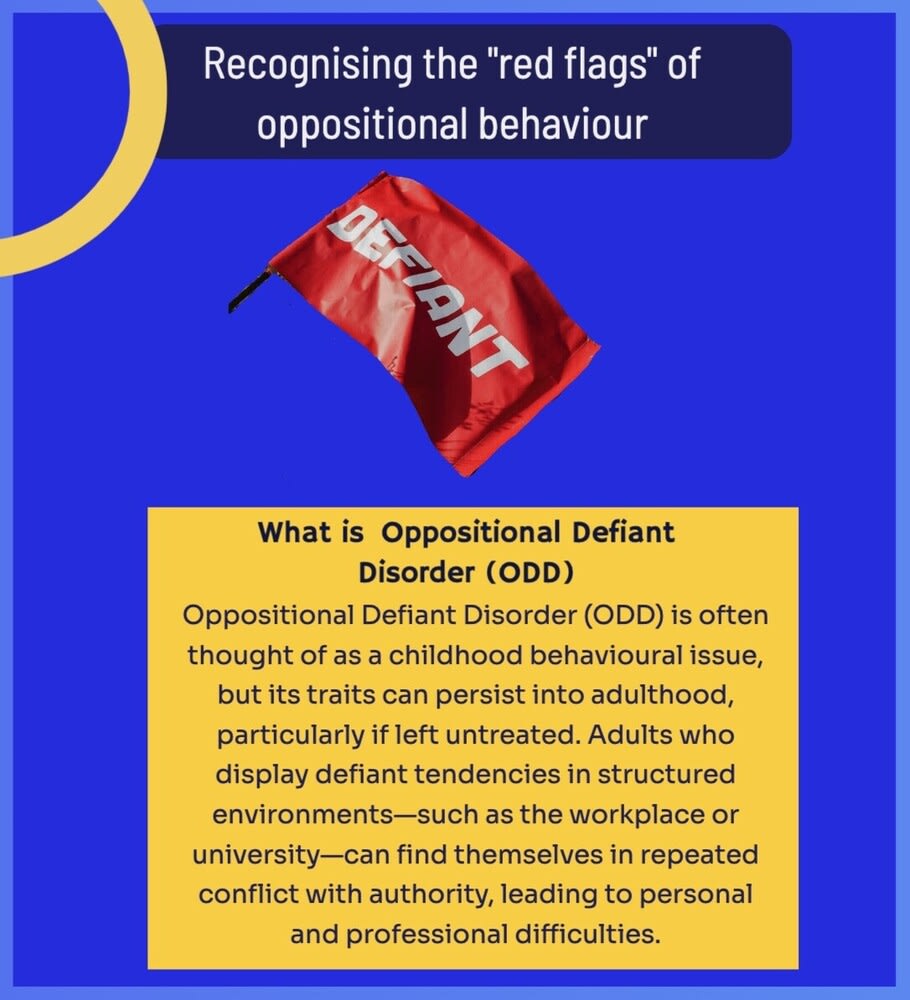Adult Oppositional Defiant Disorder

posted 26th September 2024
Oppositional Defiant Disorder in Adulthood: Understanding the Impact and Managing Defiant Behaviour in the Workplace and University
Oppositional Defiant Disorder (ODD) is often thought of as a childhood behavioural issue, but its traits can persist into adulthood, particularly if left untreated. Adults who display defiant tendencies in structured environments—such as the workplace or university—can find themselves in repeated conflict with authority, leading to personal and professional difficulties. Recognising the "red flags" of oppositional behaviour early on can prevent this defiance from escalating into life-disrupting patterns.
In this article, we will explore how defiance shows up in adulthood, the red flags to watch for, and strategies for managing these behaviours in a way that allows individuals to thrive, both personally and professionally.
When Red Flags of Defiance Appear in Adulthood
Much like the red flag metaphor often used to signal potential problems in relationships, defiant behaviour in adults presents its own set of red flags. These warning signs serve as indicators that the individual’s oppositional behaviour is moving beyond normal resistance and into a pattern that could cause serious disruption in their life.
The image of a red flag with “Defiant” written on it symbolises this turning point, where defiance becomes more than a personality trait—it becomes a consistent pattern that can negatively affect relationships, education, or career paths. Recognising these red flags early on is crucial for both the individual and those around them to address defiance before it leads to long-term issues.
Red Flags of Defiant Behaviour in the Workplace and University:
Persistent Argumentativeness
One of the first red flags is persistent argumentativeness with authority figures such as managers, supervisors, or professors. This may go beyond normal workplace disagreements or academic debates, manifesting as an unwillingness to accept any form of direction or instruction. Individuals may argue over minor requests, challenge rules unnecessarily, or resist tasks simply because they don’t want to comply.
Example: A university student might repeatedly challenge assignment deadlines, not because they are unfair, but because they dislike the feeling of being controlled. In a workplace setting, this could look like an employee regularly challenging policies like reporting procedures or attendance requirements, creating a reputation for being difficult to work with.
Refusal to Follow Rules
Another red flag is the refusal to follow established rules or procedures, especially when the individual sees those rules as irrelevant or beneath them. While some rules may indeed be arbitrary, adults with ODD-like tendencies often oppose even reasonable boundaries or expectations, which can result in disciplinary action at work or academic penalties at school.
Example: A worker might refuse to comply with safety regulations because they see them as unnecessary, even though the rules are in place to protect them and others. A student might skip mandatory group assignments because they prefer to work alone, ignoring the academic consequences.
Frequent Blaming of Others
A significant red flag in ODD is a tendency to blame others for problems, rather than taking responsibility for one's own actions. In the workplace or academic environments, this can create a toxic atmosphere where the individual refuses to accept constructive criticism or feedback, instead focusing on how others are at fault.
Example: An employee who consistently misses deadlines might accuse their manager of poor communication or unfair expectations, without acknowledging their own role in the issue. Similarly, a student who fails a course might blame the professor’s teaching style, rather than their own lack of effort or participation.
Emotional Outbursts or Resentment
Emotional outbursts of anger, frustration, or resentment are another red flag that defiance is becoming problematic. While stress is normal in high-pressure environments, individuals with ODD-like tendencies may react disproportionately to minor conflicts, lashing out at coworkers, professors, or peers in ways that escalate tensions unnecessarily.
Example: A student who disagrees with a grade may become emotionally confrontational with the professor, or an employee who feels slighted might lash out in a meeting, turning a minor issue into a major conflict. These emotional outbursts can lead to disciplinary measures, strained relationships, or even job loss.
When Defiance Becomes a Problem: The Continuum of ODD in Adulthood
The red flags of defiance typically show up on a continuum. Not all oppositional behavior leads to ODD, and for many adults, minor defiance may never become a significant issue. However, when these behaviours become persistent and start disrupting personal, academic, or professional life, they can transition into a problem that requires intervention.
This transition is crucial to recognise, especially in environments where rules and authority are essential for maintaining structure. In these cases, defiance no longer serves as a healthy expression of individuality or independence—it becomes a barrier to success.
Managing Defiance: Strategies for Turning Red Flags into Growth
Once the red flags of defiant behaviour are identified, the next step is to learn how to manage those tendencies in a productive way. Recognising and addressing defiance early can prevent it from escalating into larger problems.
1. Self-Reflection and Pausing Before Reacting
When defiant impulses arise, it's helpful for individuals to pause and reflect before reacting. Acknowledging the emotional drive behind the opposition (anger, frustration, or a dislike of being controlled) allows time for more rational thought. Asking questions like, “Is this worth the conflict?” or “What will the long-term consequences be?” can help reduce the impulse to react negatively.
2. Choosing Battles Wisely
Adults with oppositional tendencies can benefit from learning to pick their battles. Not every rule is worth defying, and understanding which rules are flexible and which are non-negotiable can help reduce unnecessary conflict. By focusing energy on important issues, rather than opposing authority on minor matters, individuals can find healthier ways to express independence without damaging relationships or opportunities.
3. Seeking Professional Help
If defiant behaviour becomes a significant barrier to success in professional or academic settings, seeking the help of a qualified mental health professional is essential. Therapy, particularly Cognitive Behavioural Therapy (CBT), can be an effective way to address oppositional patterns and help individuals develop better coping strategies. CBT helps individuals recognise negative thought patterns, challenge them, and replace them with more constructive behaviours.
Recognising warning signs early and addressing them through self-reflection, strategic decision-making, and professional help can help individuals manage their defiant tendencies in ways that foster growth, rather than conflict. By learning to balance individuality with responsibility, adults with ODD-like tendencies can thrive without being weighed down by unnecessary defiance.




